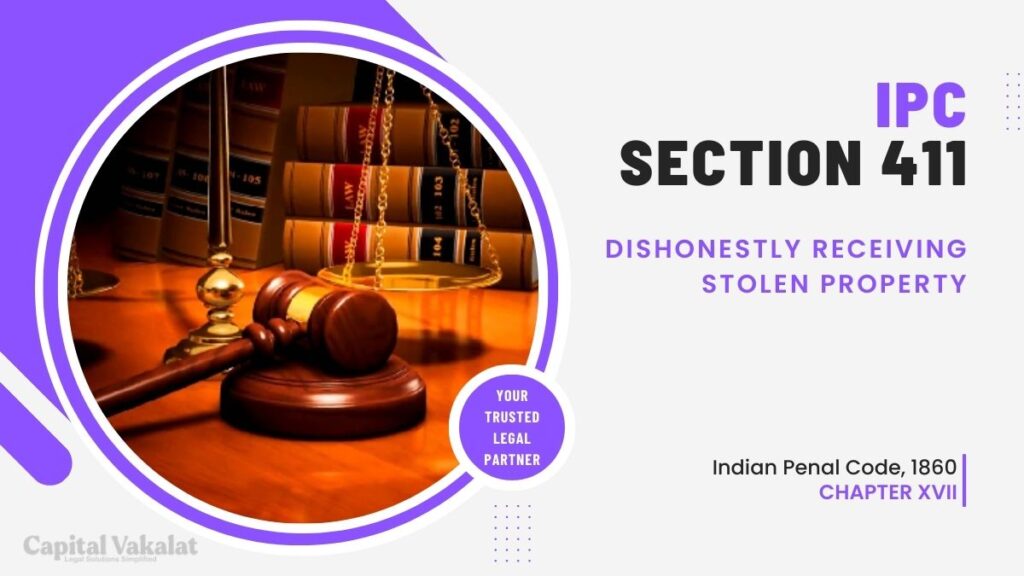Section 411 of the Indian Penal Code (IPC) addresses the issue of dishonestly receiving stolen property. In the realm of criminal law, this section plays a crucial role in curbing the illicit trade and possession of stolen goods. Understanding the nuances of Section 411 IPC is essential for both legal professionals and the general public as it pertains to the broader framework of property offenses.

This article delves into the intricacies of Section 411 IPC, examining its historical context, legal implications, and challenges in enforcement.
Understanding Section 411 IPC
Section 411 IPC defines the offense of dishonestly receiving stolen property. To establish guilt, certain elements must be proven, including the accused’s knowledge of the property’s stolen nature. The legal consequences for individuals found guilty under this section can vary, ranging from fines to imprisonment. The underlying principle is to discourage individuals from participating in the market for stolen goods.
Historical Context
The evolution of laws related to stolen property reflects society’s changing perceptions and needs. Over the years, amendments have been made to strengthen legal frameworks, adapting to the challenges posed by increasingly sophisticated criminal activities. Exploring the historical context provides valuable insights into the legislative intent behind Section 411 IPC.
Cases and Precedents
Notable legal cases have shaped the interpretation and application of Section 411 IPC. Analyzing these cases helps in understanding the judicial approach to dishonestly receiving stolen property and its impact on the development of legal principles. Precedents play a pivotal role in guiding legal professionals and setting standards for future cases.
Challenges in Prosecution
Law enforcement often faces challenges in proving dishonest reception, especially when dealing with organized crime or technologically savvy criminals. Understanding the difficulties in prosecution allows for a more comprehensive evaluation of the effectiveness of Section 411 IPC in the real world. Additionally, legal defenses commonly employed in such cases warrant examination.
Penalties and Punishments
The severity of punishments for individuals found guilty under Section 411 IPC varies, taking into account factors such as the value of the stolen property and the offender’s criminal history. A comparative analysis with other jurisdictions provides insights into global approaches to combatting the receipt of stolen goods.
Role of Intent in Prosecution
Examining the role of intent is crucial in establishing guilt under Section 411 IPC. The mental element of the offense, i.e., knowingly receiving stolen property, adds a layer of complexity to legal proceedings. Clarifying the nuances surrounding intent contributes to a more nuanced understanding of the offense.
Public Perception and Awareness
Public misconceptions about Section 411 IPC can hinder effective enforcement. Dispelling common myths and increasing public awareness of the consequences of dishonestly receiving stolen property are essential components of a comprehensive strategy to combat property offenses. Education plays a key role in fostering a sense of responsibility within the community.
Reform and Amendments
Ongoing discussions and proposals for reforming laws related to stolen property deserve attention. Striking a balance between stringent measures to deter offenders and safeguarding individual rights is a delicate task. Exploring potential amendments ensures that legal frameworks remain adaptive and effective in addressing emerging challenges.
Conclusion
In conclusion, Section 411 IPC serves as a vital tool in combating the illicit trade and possession of stolen property. This article has explored the historical context, legal implications, and challenges associated with dishonestly receiving stolen goods. As society evolves, so must our legal frameworks to effectively address the complexities of property offenses.
Frequently Asked Questions
Can someone be charged under Section 411 IPC without knowledge of the property being stolen?
Knowledge of the stolen nature of the property is a key element of the offense under Section 411 IPC. Without this knowledge, it becomes challenging to establish guilt.
How does Section 411 IPC contribute to reducing the market for stolen goods?
By imposing legal consequences on individuals involved in the receipt of stolen property, Section 411 IPC acts as a deterrent, discouraging participation in the illicit market for stolen goods.
What are some common legal defenses against charges under Section 411 IPC?
Common defenses may include lack of knowledge about the stolen nature of the property, coercion, or duress. However, the effectiveness of these defenses depends on the specific circumstances of each case.
Are there ongoing efforts to reform laws related to stolen property offenses?
Yes, discussions and proposals for reforming laws related to stolen property offenses are ongoing, with a focus on balancing the need for stringent measures with protecting individual rights.